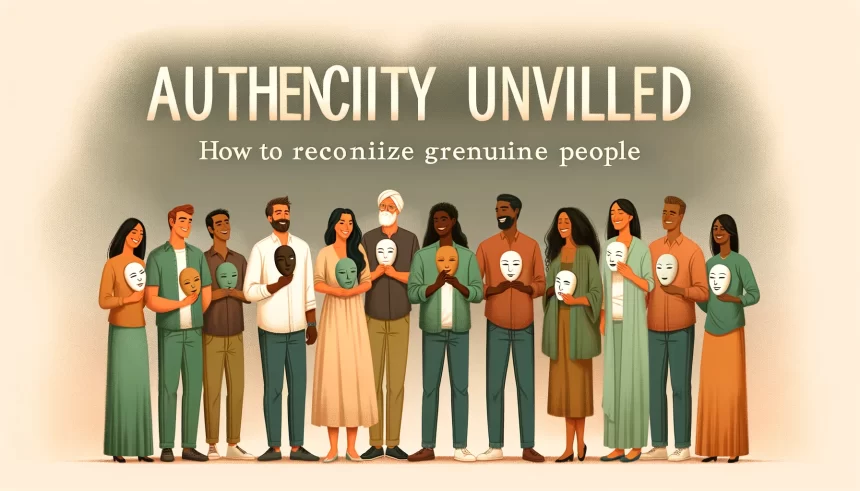As humans, we crave authenticity in our interactions and relationships. We want to surround ourselves with individuals who are genuine and trustworthy. But, with countless individuals trying to portray themselves as authentic, it can be challenging to determine who truly is. In this article, we will explore the subtle signs and behaviors that can help you recognize genuine people and how to tell if someone is authentic.
- Understanding Authenticity: What It Means to be Genuine
- Authentic Behavior Indicators: How to Spot Authenticity in Others
- Genuine Qualities to Look For: Characteristics of an Authentic Person
- The Importance of Trust: Building Authentic Relationships
- Navigating Authenticity in Relationships: Real or Fake?
- Pay Attention to Body Language
- Listen Attentively
- Look for Consistency in Behavior
- Trust Your Gut Feeling
- Authenticity and Communication: The Power of Transparency
- Cultivating Authenticity: Embracing Your True Self
- Nurturing Authenticity in Others: Encouraging Genuine Behavior
- The Challenges of Being Authentic: Overcoming Obstacles
- Conclusion
- FAQ
- How can I tell if someone is authentic?
- What are some genuine behavior cues to watch for?
- What are the characteristics of an authentic person?
- How can I spot authenticity in others?
- Why is trust important in building authentic relationships?
- How can I determine if someone is real or fake in a relationship?
- How does transparency contribute to authenticity in communication?
- How can I embrace my true self and cultivate authenticity?
- How can I encourage genuine behavior and nurture authenticity in others?
- What are the common challenges faced by authentic individuals?
- Why is recognizing genuine individuals important?
Key Takeaways
- Authentic people display consistent behavior and values over time.
- Genuine individuals are comfortable being vulnerable and expressing their true thoughts and feelings.
- Authenticity fosters deeper connections and trust in relationships.
- Recognizing genuine traits can help you make better decisions in your personal and professional life.
- Being true to yourself and embracing your uniqueness is key to cultivating authenticity.
Understanding Authenticity: What It Means to be Genuine
Authenticity is a complex concept that encompasses a range of behaviors and personality traits. Genuine people tend to possess a unique set of qualities that distinguish them from others. Understanding these characteristics can help us identify and appreciate authenticity when we see it.
Signs of Authenticity
Some signs of authenticity include being honest, transparent, and vulnerable. Authentic people tend to be introspective and self-aware, and they are comfortable with expressing their true thoughts and feelings.
Authentic individuals also prioritize building meaningful relationships and are not afraid to show their imperfections. They value their personal growth and tend to be curious and open-minded.
Authentic Personality Traits
Authentic individuals exhibit a range of personality traits that are consistent with their genuine nature. Some of these traits include:
- Integrity: they adhere to their values and principles.
- Empathy: they are attuned to the emotions and experiences of others.
- Compassion: they express care and concern for others.
- Resilience: they possess the ability to bounce back from setbacks and challenges.
- Self-awareness: they are in tune with their thoughts, feelings, and behaviors.
Why Authenticity Matters
Being authentic allows us to build deeper and more meaningful relationships with others. Authentic individuals tend to be more trustworthy and reliable, and they inspire others to be genuine as well. Cultivating authenticity in our own lives can help us live more fulfilling, meaningful lives and positively impact those around us.
Authentic Behavior Indicators: How to Spot Authenticity in Others
Authenticity is a characteristic that’s crucial for building real and trustworthy relationships. But how do you identify authentic people? What separates the real deal from the fakes? Spotting authenticity in others depends on observing specific characteristics and behaviors that are associated with genuine individuals. Here are some common authentic behavior indicators:
- Consistency: Authentic people tend to behave consistently over time.
- Transparency: Genuine individuals are open and honest about their thoughts and feelings.
- Empathy: People who value authenticity often possess high levels of empathy and treat others with respect and kindness.
- Self-awareness: Authentic individuals are self-aware, understand their values and live according to them.
- Humility: Genuine people are humble and recognize their flaws and limitations.
By observing these behavior indicators, we can sift through the facade of fakeness and recognize genuine personalities in our lives.
Genuine Qualities to Look For: Characteristics of an Authentic Person
Authentic individuals embody a unique set of qualities that make them easily identifiable. By recognizing these characteristics, we can better discern true authenticity in others. Here are some of the core traits to look for:
| Qualities | Description |
|---|---|
| Transparency | Authentic individuals are open and honest about their thoughts and feelings. They are transparent in their communication and interactions with others. |
| Vulnerability | Being authentic means embracing vulnerability. Genuine individuals are not afraid to show their imperfections and emotions, even when it may be uncomfortable. |
| Empathy | Authenticity is grounded in empathy. Those who possess this quality are able to understand and connect with others on a deeper level, creating a sense of trust and understanding. |
| Self-Awareness | Self-awareness is an essential trait of authentic individuals. They understand their strengths and weaknesses and are not afraid to be true to themselves. |
| Integrity | Integrity is the foundation of authenticity. Those who possess this quality are honest and principled, and always act in alignment with their values. |
| Consistency | Authentic individuals are consistent in their behavior and interactions with others. They do not pretend to be someone they are not or change their behavior to fit in with others. |
The Power of Genuine Qualities
Authenticity is an essential component of building genuine relationships and fostering a positive community. By recognizing and valuing genuine qualities in ourselves and others, we can create a culture of authenticity and validation.
“To be yourself in a world that is constantly trying to make you something else is the greatest accomplishment.” – Ralph Waldo Emerson
The Importance of Trust: Building Authentic Relationships
Trust is the foundation of any genuine relationship. When trust is present, we feel safe and secure in our interactions with others. Authenticity and trust go hand in hand, as authentic individuals are more likely to be honest and transparent in their actions and words. Authenticity fosters an environment of trust and promotes genuine connection, where individuals feel comfortable being themselves without fear of judgment or rejection.
When building relationships, it is important to surround ourselves with authentic individuals who prioritize trust and honesty in their interactions. This can be achieved through active communication and a commitment to openness and transparency. By prioritizing trust, we create an environment that values genuine connection and supports the growth of authentic relationships.
However, building trust can be challenging, especially when past experiences have caused us to doubt others’ intentions. It is important to recognize that building trust is a process that requires time, effort, and commitment from both parties. Authentic individuals understand this and are willing to put in the work to establish trust in their relationships.
In conclusion, trust is a vital component of authenticity and genuine relationships. By prioritizing trust in our interactions and surrounding ourselves with authentic individuals, we can foster an environment of openness and transparency that promotes the growth of meaningful connections.
Navigating Authenticity in Relationships: Real or Fake?
Building genuine relationships is no easy feat, especially when determining if someone is truly authentic or not. The challenge lies in recognizing subtle differences between the real and the fake. Here are some authenticity recognition tips that can help determine whether someone is genuine:
Pay Attention to Body Language
Body language can offer valuable insight into a person’s authenticity. A genuine person tends to exhibit an open and relaxed posture, maintaining eye contact and using expressive hand gestures to communicate. Conversely, someone who is fake might come across as rigid, fidgety, and avoid eye contact.
Listen Attentively
An authentic person is typically an active listener, showing genuine interest in what the other person is saying, asking relevant questions and offering thoughtful responses. Conversely, someone who is fake might be self-centered, dominating the conversation, and giving rehearsed responses.
Look for Consistency in Behavior
An authentic person exhibits consistent behavior across a variety of situations. They do not put on a false persona or change their behavior to impress others. Someone who is fake might appear like a chameleon, changing their mannerisms and attitudes depending on the person they are with or the situation they are in.
Trust Your Gut Feeling
Intuition can be a useful tool when it comes to recognizing authenticity in relationships. If something feels off, it probably is. Trusting your instincts can help you detect insincerity and avoid toxic relationships.
Authenticity and Communication: The Power of Transparency
Authentic communication is essential for building and maintaining genuine relationships. Transparency is a key component of authenticity, as it involves being open and honest in our interactions with others.
When we communicate authentically, we are able to express our true thoughts and feelings, which fosters trust and strengthens connections. Authentic communication is not about being perfect or always saying the right thing. Instead, it’s about showing up as our genuine selves and speaking from the heart.
In order to communicate authentically, it’s important to be transparent in our behavior and actions. This means being truthful, reliable, and consistent in what we say and do. When we act with transparency, we demonstrate our integrity and build trust with others.
Authentic communication and transparent behavior go hand in hand. By being open and honest in our interactions, we can create a culture of authenticity that supports and encourages genuine relationships.
Cultivating Authenticity: Embracing Your True Self
To cultivate authenticity in our relationships, we must first embrace our true selves. When we are honest and authentic with ourselves, we can better understand our values and beliefs, which serves as a foundation for all of our interpersonal interactions. By embracing our true selves, we can build genuine connections with those around us.
Embracing our true selves can be challenging, especially in a world that encourages conformity and fitting in. However, being true to ourselves is essential for living a fulfilling and authentic life. To cultivate authenticity, we must embrace our unique qualities, even if they go against societal norms or expectations.
One way to embrace our true selves is by practicing self-reflection and mindfulness. By taking time to reflect on our thoughts and emotions, we can gain insight into our true selves. Additionally, mindfulness practices can help us stay grounded in the present moment and connect with our innermost selves.
“Authenticity is not something we have or don’t have. It’s a practice, a conscious choice of how we want to live. Authenticity is a collection of choices we make every day. It’s about the choice to show up and be real. The choice to be honest. The choice to let our true selves be seen.” – Brené Brown
Cultivating authenticity means being true to ourselves in all aspects of our lives. This includes being honest and transparent in our communication, setting boundaries that align with our values, and pursuing our passions and interests without judgment from others. By embracing our true selves, we can create a life that is fulfilling and authentic.
Nurturing Authenticity in Others: Encouraging Genuine Behavior
Creating an environment that nurtures authenticity in others can help promote genuine behavior. Here are some strategies to encourage authenticity in those around you:
- Model authentic behavior: Lead by example and demonstrate genuine behavior in your interactions with others. This can help encourage others to do the same.
- Encourage self-expression: Give others the space and support they need to express themselves freely. This can help build trust and create a safe, welcoming environment.
- Listen actively: Be an active listener and give others your full attention. This can help foster open and honest communication, and make others feel heard and validated.
- Provide positive feedback: When you notice authentic behavior in others, provide positive feedback and reinforcement. This can help reinforce the value of authenticity and encourage continued genuine behavior.
- Avoid judgment: Avoid judging others for expressing themselves authentically, even if their behavior or opinions differ from your own. This can help create a culture of acceptance and support.
By following these strategies, we can help foster a culture of authenticity and encourage genuine behavior in those around us.
The Challenges of Being Authentic: Overcoming Obstacles
While authenticity is highly valued, it can be difficult to maintain due to various challenges. Whether it’s societal pressures, fear of judgment, or personal obstacles, staying true to oneself often requires a great deal of courage and resilience.
Common Challenges to Authenticity
- Conformity: The pressure to fit in and conform to societal norms can make it challenging to express oneself authentically.
- Fear of rejection: The fear of being rejected or ostracized for being different can lead individuals to hide their true selves.
- Vulnerability: Authenticity requires vulnerability, which can be challenging for those who are uncomfortable exposing their true selves.
- Self-doubt: Lack of self-confidence and fear of being misunderstood can lead to self-doubt and inhibit expression of one’s authentic self.
Overcoming Obstacles to Authenticity
Overcoming the challenges of authenticity requires self-reflection, courage, and willingness to take risks. Here are some strategies for staying true to yourself:
- Self-reflection: Take time to reflect on your values, beliefs, and aspirations, and align your actions accordingly.
- Vulnerability: Embrace vulnerability as a strength and practice expressing your true thoughts and emotions.
- Self-acceptance: Recognize that you are unique and deserving of love and acceptance, regardless of others’ opinions.
- Surround yourself with authentic people: Seek out and build relationships with individuals who value authenticity and can support you in staying true to yourself.
Remember, authenticity is a journey, not a destination. It takes time and effort to cultivate, but the rewards of living an authentic life are immeasurable.
Conclusion
In conclusion, recognizing authenticity in others is crucial for building meaningful relationships and fostering a genuine community. By understanding the characteristics and behaviors of authentic individuals, we can more easily identify and surround ourselves with people who share our values and principles.
Building trust with authentic individuals is paramount to creating lasting relationships, and transparency in communication is one of the key ways to achieve this. It’s important to remember that cultivating authenticity begins within ourselves, and by embracing our true selves, we set an example for others to follow.
However, it’s important to note that maintaining authenticity can be challenging at times due to societal pressures and personal obstacles. By acknowledging these challenges and developing strategies to overcome them, we can stay true to ourselves and continue to embody the qualities of authenticity.
Ultimately, recognizing genuine individuals and fostering authenticity in ourselves and others can lead to a more fulfilling and satisfying life. By staying true to our values and principles, we create a positive and genuine environment that encourages others to do the same.
Thank you for reading and may you continue to recognize and appreciate authenticity in those around you.
FAQ
How can I tell if someone is authentic?
Recognizing authenticity in others can be challenging, but there are a few signs to look out for. Genuine people often display consistency in their words and actions, are comfortable being themselves, and value honesty and transparency. They are also good listeners and show empathy towards others.
What are some genuine behavior cues to watch for?
Genuine behavior cues can include openness and vulnerability, a willingness to admit mistakes, and a genuine interest in others. Authentic people often show compassion and prioritize building meaningful connections. They are also not afraid to express their values and stay true to themselves.
What are the characteristics of an authentic person?
Authentic individuals tend to exhibit traits such as self-awareness, integrity, and humility. They are comfortable with vulnerability, embrace their uniqueness, and have a strong sense of purpose. Authentic people are also genuine in their interactions and display consistency in their beliefs and values.
How can I spot authenticity in others?
To spot authenticity in others, pay attention to consistent behavior, genuine expressions of empathy and compassion, and an ability to be vulnerable and express emotions. Look for individuals who are true to themselves and have a strong sense of integrity. Trust your instincts and observe how they treat others.
Why is trust important in building authentic relationships?
Trust is crucial in building authentic relationships because it creates a safe and secure environment for open and honest communication. When trust is present, individuals feel comfortable being their true selves and sharing their thoughts, feelings, and experiences without fear of judgment or betrayal.
How can I determine if someone is real or fake in a relationship?
Determining if someone is real or fake in a relationship requires observing their consistency, accountability, and ability to empathize. Genuine individuals will show genuine care and respect for you, communicate openly and honestly, and demonstrate their reliability through their words and actions. Look for any inconsistencies or red flags that may indicate a lack of authenticity.
How does transparency contribute to authenticity in communication?
Transparency is vital in authentic communication as it fosters trust and understanding. When individuals are transparent, they share their thoughts, feelings, and intentions openly and honestly, creating an environment where all parties can feel heard and validated. Transparency promotes genuine connections and prevents misunderstandings.
How can I embrace my true self and cultivate authenticity?
Embracing your true self involves self-reflection, self-acceptance, and the willingness to let go of societal expectations. Focus on your values, interests, and passions, and prioritize living in alignment with them. Practice self-care, surround yourself with supportive individuals, and be willing to take risks and embrace vulnerability.
How can I encourage genuine behavior and nurture authenticity in others?
To encourage genuine behavior in others, lead by example and demonstrate authenticity in your own actions. Create a safe and non-judgmental space where individuals feel comfortable expressing their true selves. Show appreciation for authenticity and provide constructive feedback that supports personal growth and self-reflection.
What are the common challenges faced by authentic individuals?
Authentic individuals may face challenges such as societal pressures to conform, fear of judgment or rejection, and navigating relationships with individuals who are less authentic. The journey towards authenticity can be a continuous process of self-discovery and overcoming these obstacles by staying true to oneself despite external influences.
Why is recognizing genuine individuals important?
Recognizing genuine individuals is important as it allows us to build meaningful relationships based on trust, respect, and authenticity. Surrounding ourselves with genuine people fosters a positive and supportive environment where we can be our true selves without fear of judgment or pretense.






